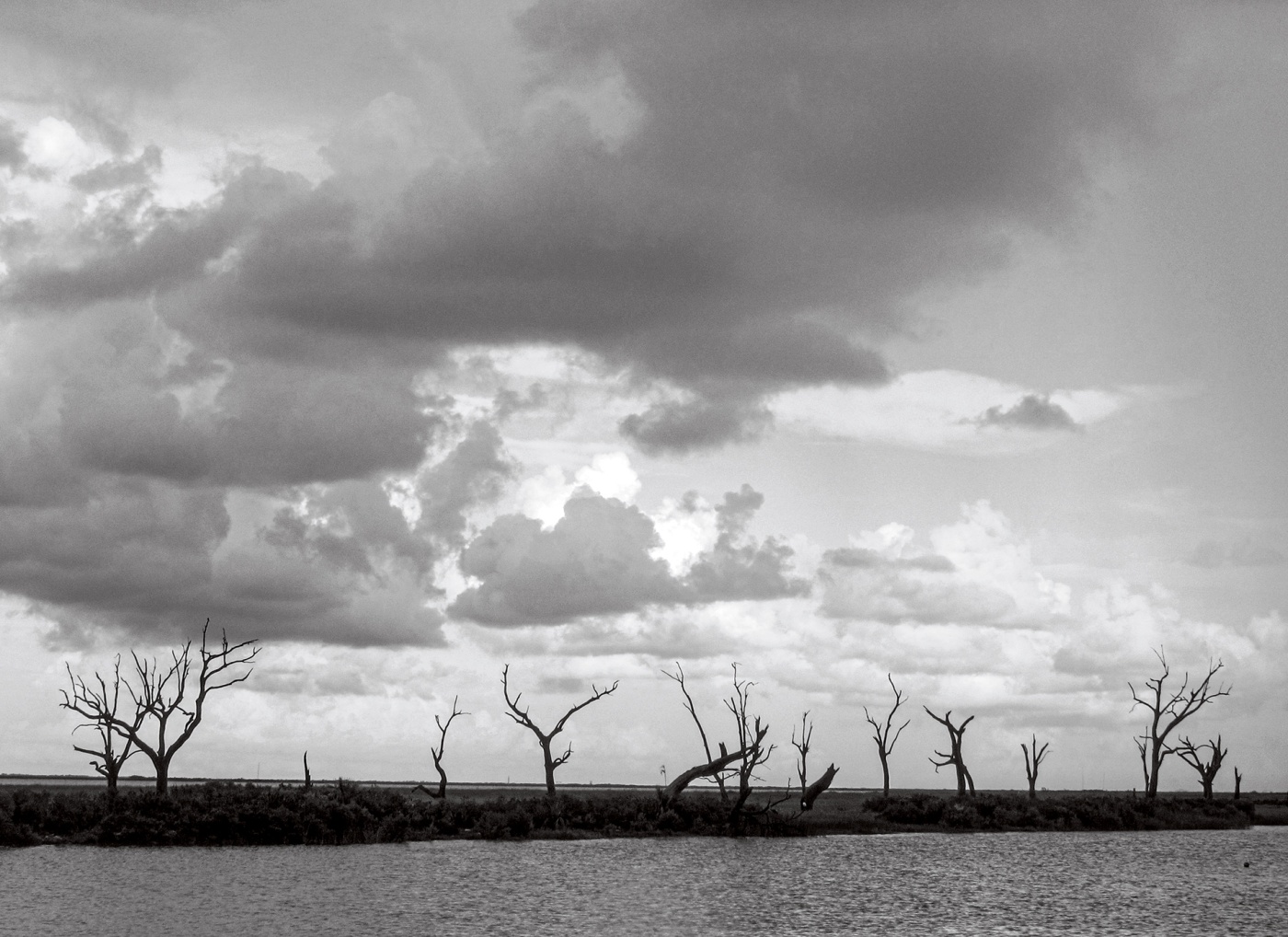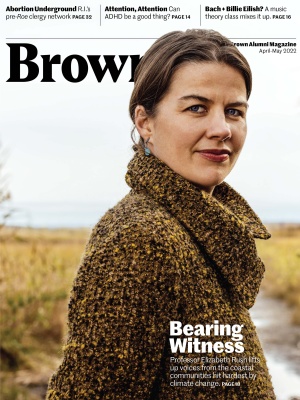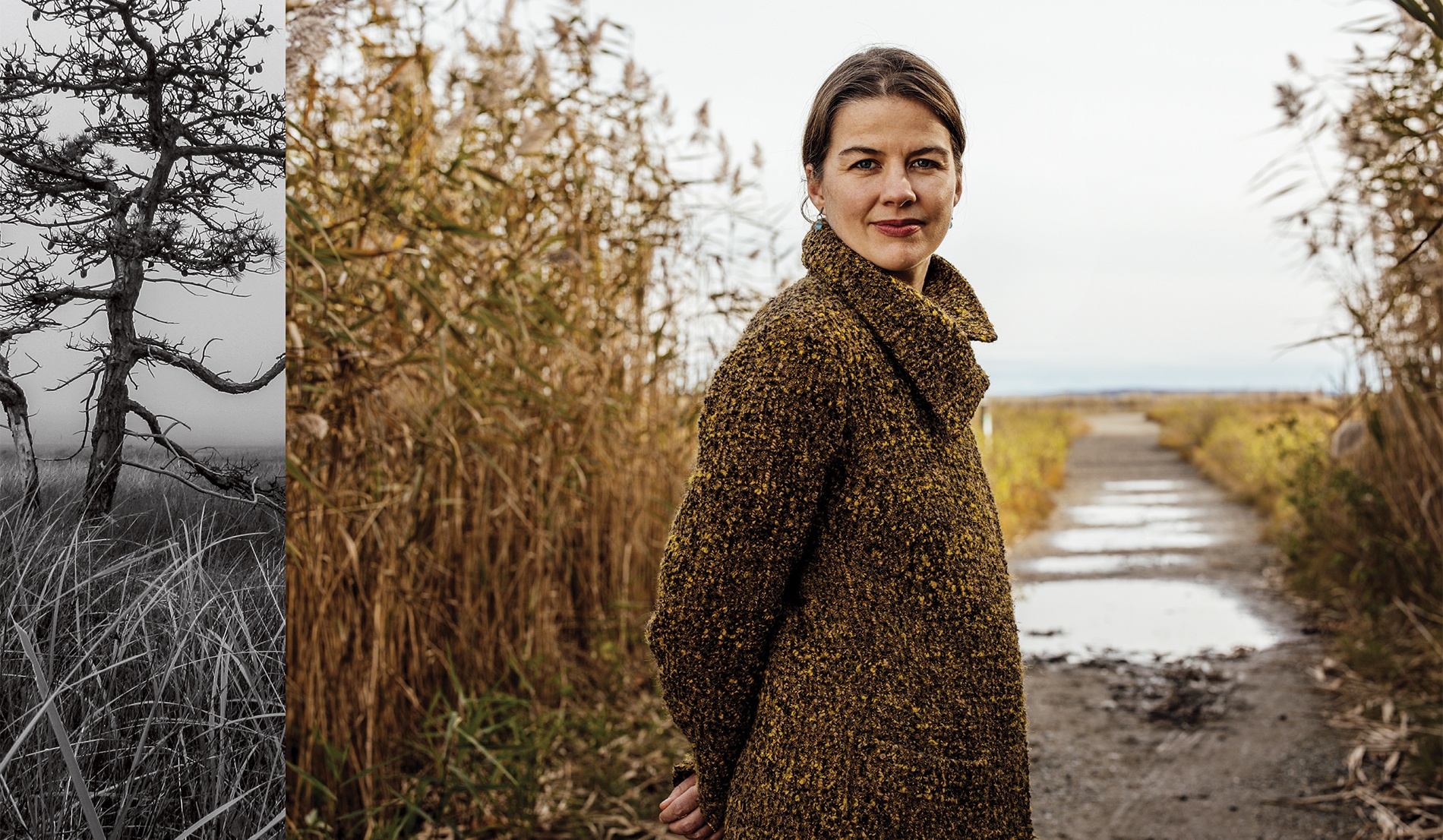
Lift Up Their Voices
Former journalist Elizabeth Rush traded news writing for testimony—allowing people in coastal communities to tell their climate change stories their way.
The idea for English professor Elizabeth Rush’s book Rising: Dispatches from the New American Shore first came to her nearly a decade ago at the site of a very different shoreline, where her toes met the muddy edges of the Ganges River. In 2012, years before coming to College Hill, Rush was on assignment for the French publication Le Monde Diplomatique, covering the conclusion of the India-Bangladesh border fence from both sides of the frontier. At the time, the barbed web of steel and concrete was slated to become the longest border fence on the planet, regarded from all corners of the world with equal parts curiosity and apprehension.
Yet Rush, deeply immersed in the community, discovered that this project of global fascination wasn’t at all the story that Bangladeshi residents themselves wanted to tell. “The one thing that I heard in Bangladesh a lot was that the fence wasn’t such a big deal—it was the arrival of salt in the aquifer that had really changed the lives of residents,” explains Rush. “That had to do with sea level rise, and it also had to do with [the fact that] India essentially withheld over 50 percent of the Ganges flow as it entered into Bangladesh for their own irrigation projects.”
Rush was determined to share what she perceived as the “real story”—the one about water and ecology that most impacted the community—but the editors wouldn’t bite, instead affording her a brief sidebar which she cleverly entitled “Damming the Giants” and attempted to pack with as many details on climate change as possible. Rush left Bangladesh shortly thereafter, but the stories she had discovered refused to leave her.
“I returned from that reporting trip really changed: I knew that climate change was with us in the present tense and that people were already migrating because of it,” she says. While environmental justice journalism seems ubiquitous today, Rush remembers that the climate crisis was woefully underreported as recently as a decade ago. “If it did make it into the news, it was always in Bangladesh, and I was pretty tired of that climate cliché,” she adds. “I thought, if it’s happening there, it has to be happening in the United States, and I’m going to go try to find those stories.”
“I knew that climate change was with us in the present tense and that people were already migrating because of it... I thought, ‘I’m going to go try to find those stories.’”
Though her book spans coastlines from San Francisco to Staten Island, Rush’s persuasive case for climate change begins close to home, at Jacob’s Point, Rhode Island. This marshy preserve in the town of Warren is the site of the book’s prologue, cryptically entitled “The Password,” which recounts Rush’s introduction to the ecology of her new home in 2017, as a recent transfer to the Brown English Department from Bates College in Maine.
The mystery stays alive long enough for Rush to dive into a masterfully crafted ode to the tupelo, a crimson-leafed gum tree common to Rhode Island’s tidal marshes. In ordinary climates, the tree’s Native American name (literally: “swamp tree”) would suggest “a love of periodically soaking in water,” Rush writes in Rising—but these days, the tupelo’s dwindling numbers and waterlogged roots are both physical indicators that higher tides are endangering the species and symbolic of the environmental degradation ravaging the entire wetland ecosystem.
“When we say the word tupelo we begin to see that both the trees themselves and the very particular ecology they once depended on are… gone,” she writes. A paragraph break forces the reader’s mind to pause exactly where the author’s does, before her reflection continues: “Sometimes a key arrives before the lock. Now I am thinking, sometimes the password arrives before the impasse. This word, when spoken or written down, might grant us entry into a previously unimaginable awareness—that the coast, and all the living beings on it, are changing radically.”
So begins Rising—a 2019 Pulitzer Prize finalist and the first nonfiction book by a nonprofit publisher ever to earn this distinction in general nonfiction. Since its publication in 2018, the collection of first-person narratives on the impact of climate change has become a central text in the environmental justice community, regarded as the eloquent yet fierce battle cry of global warming activists across the country.
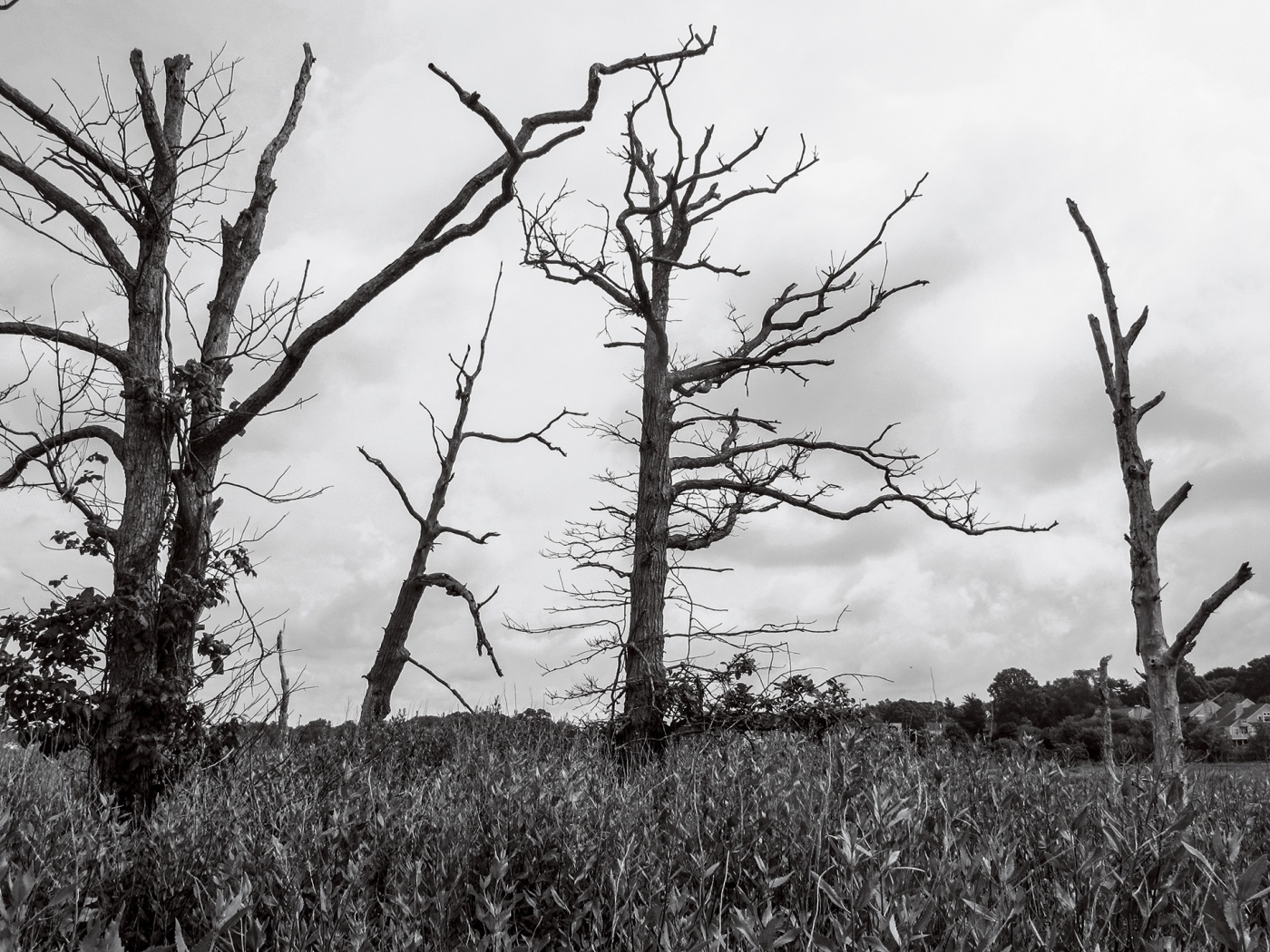
The book’s first chapter rewinds in time, documenting Rush’s first stop in what she describes as “the long odyssey of looking for places that were being impacted in the present tense by rising sea levels.” Before the idea of Rising was so much as a twinkle in her eye, Rush visited the Isle de Jean Charles, Louisiana, which has since become ground zero for American climate refugees. Still occupying the role of eco-journalist, she conducted extensive interviews with the people she met there, each of whom surprised her by defying expectations about what impact rising sea levels have on a community.
“I went into writing about this thinking that ‘If your house floods three times, you move,’ as if there’s something really rational about that response,” Rush explains. “But I was figuring out that it’s not rational—it’s really unique, and it’s profoundly determined by historical social circumstances and then the way the person navigates and responds to them.”
Through her initial research, Rush found many coastland residents committed to remaining in the places they had put down roots, even as the water eroded much of what they once called home. Finances and safety, factors that often motivate home ownership decisions, could not unmoor the anchor of belonging that tied these people to their homeland. What followed for Rush were trips to Maine, Miami, and many more shores—each site the subject of its own article (now turned chapter), and each with its own way of subverting the stereotypes of who occupies our disappearing coastlines.
“I had expected it to be wealthy, often white people living along the shore, and then it turned out that it was often the most vulnerable communities who lived married to these vulnerable landscapes,” Rush says. “I started to recognize that wetlands were these largely undervalued landscapes, thought of as aesthetically unpleasing, and it’s not by chance that low-income communities of color often live alongside them. We read about that today, but seven years ago that idea wasn’t something people talked about, and it felt like a silence that I wanted to speak into.”
“I went into writing about this thinking ‘If your house floods three times, you move,’ as if there’s something really rational about that response.”
And yet, the more entangled she became in the web of environmental journalism, the more frustrated she grew with its limitations. “After about two years, I felt pretty fatigued by the language that I had to use to get my story into the newspaper,” Rush explains. “What I never grew tired of was the stories that people living in these places would tell me.”
Nevertheless, she persisted… at least in the short-term. Rush felt caged by the click-baiting language and lengthy explanations of jargon, but they seemed to be the only way to spread the word about the urgency of rising sea levels, until a fellow professor at Bates College offered her the key she didn’t know she was looking for, in the form of a book entitled Voices from Chernobyl.
Commonly referred to in the U.S. as the “oral history of a nuclear disaster,” the nonfiction book by Nobel Laureate Svetlana Alexievitch weaves dozens of first-person narratives from the survivors of the Chernobyl meltdown into an incisive and haunting tapestry, uniting dozens of disparate and marginalized voices to achieve exactly the narrative that seemed impossible to get in the newspapers. Returning to the hours of conversation she’d already transcribed, Rush began to pivot from writing articles to writing chapters, and within less than two years, the first draft of Rising was born.
“There is an art to carving away to raise up the voice of another person in a way that honors the power of their story,” Rush says. Finding freedom in the writing style herself, the professor decided to craft a course on testimony in 2015 for students at Bates interested in climate change activism. When Rush moved to Brown, Testimony came with her, and though the course has evolved with each class of students, the core practice of social justice storytelling has remained.
“I will never be able to escape this class—it’s a part of me now—and I think that’s what an education is?” muses Abigail Barton ’22, who took the course when it was last offered in Spring 2020. “When you can’t leave it alone and when it won’t leave you alone, I think you’ve been educated.”
As someone with dyslexia, Barton found a different kind of freedom in the course, one rooted in her ability as the compiler to tell stories through conversation instead of prose, anecdote instead of essay.
“There is a little bit of eight-year-old Abby in there, terrified of being misunderstood in the written word,” she explains, “and also feeling like other people have that terror as well, not just kids who grew up with undiagnosed dyslexia in Catholic grade school. There’s something really exciting about testimony as a practice that breaks down barriers in that way.”
The course aims to localize the goals and methods used in the book to fit the needs of the community, so rather than tackle miles of shoreline, the students oriented themselves around a new and even more unlikely locale: the neighborhood supermarket. In partnership with the Urban Greens Co-op Market in Providence, the cohort of six students compiled a series of “Grower Narratives,” spotlighting the testimonies of several farmers who contribute goods to the marketplace. The project wrapped up just before COVID hit, and the intimate class size—already beneficial in such a workshop-heavy seminar—turned out to be a blessing in disguise when it came to maintaining a sense of community and continuing the search for stories mid-pandemic.
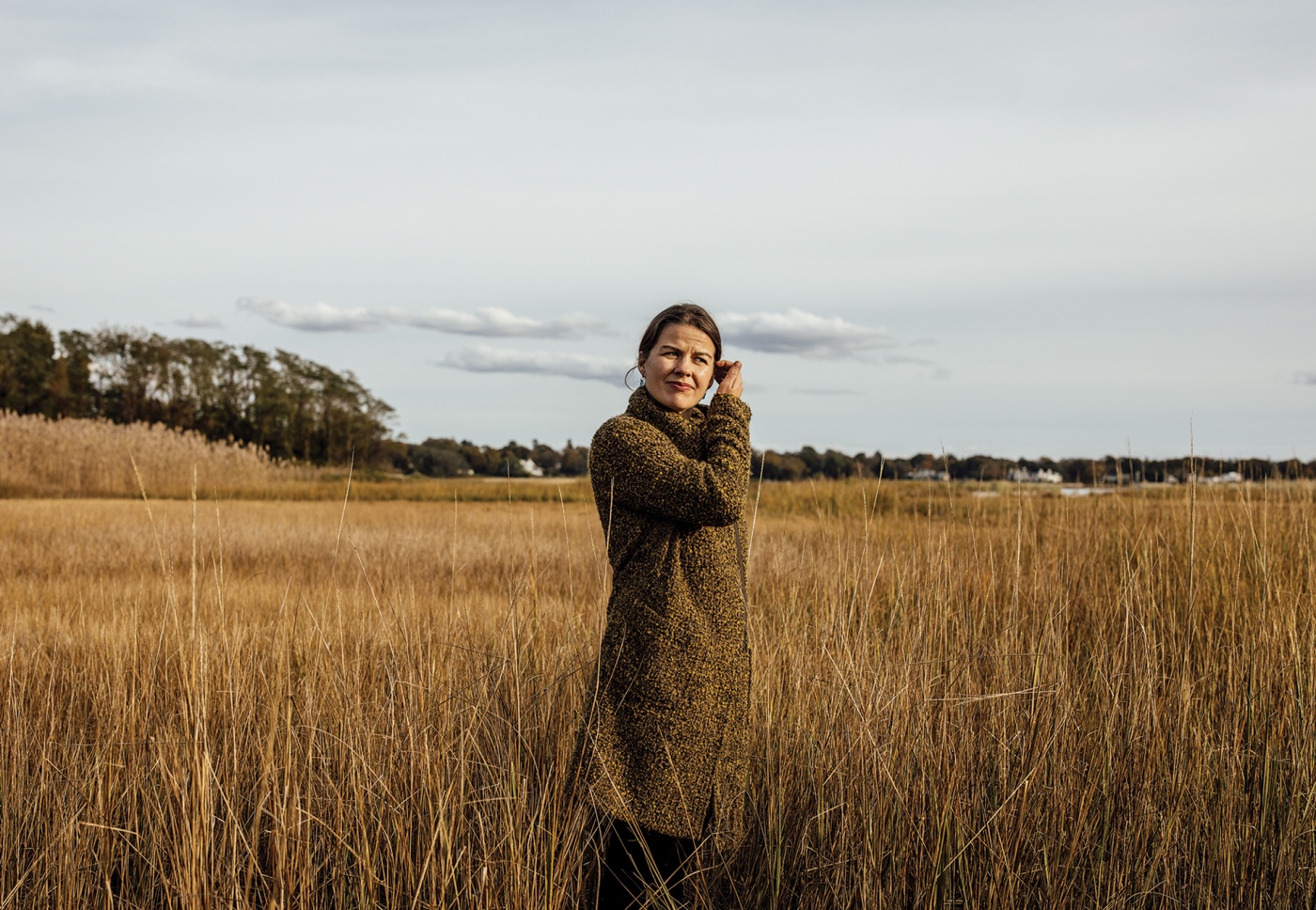
Barton points to a certain warmth and closeness with the speaker inherent to testimonial writing that she says helped her feel connected amid the turbulence of the past year.
“People like reading testimony,” she says. “It feels like being in on the conversation.” This sense of connection has carried on far beyond the class and into her work with Brown’s housing justice advocacy organization HOPE (Housing Opportunities for People Everywhere). For nearly a year, the public policy concentrator has been combing through eviction diversion requests in order to identify those who are most desperately in need of rental assistance. Many of these requests feature first-person narratives that have inspired Barton’s thesis, which is centered around mapping patterns of housing injustice in Rhode Island from the time of the state’s foundational charter to the present day.
“In the court portal, among the hundreds of cases I’ve looked at, there were some pieces from people writing letters to the court in response to the eviction filings,” she explains. “They’re these really devastating motions to stay in their homes, and I just can’t let them go. I’ve been thinking a lot about people’s voices in this system and how they are documented only in these moments of extreme crisis, and I’m like, ‘My thesis has to have testimony in it. There’s no other way.’”
Like Barton, Noah Hoffman ’22 also found himself incorporating testimony into his advocacy work in ways that felt both natural and unexpected. A RUE student (Resumed Undergraduate Education) at Brown, Hoffman spent nine years as a U.S. championship and Olympic skier before coming to College Hill. In addition to fighting for housing justice alongside Barton, he now also advocates against the use of performance-enhancing drugs among professional athletes. As part of his mission to pass the Rodchenkov Anti-Doping Act (signed into law by the U.S. Congress last December) to criminalize international doping conspiracies, he served as ghost- and co-writer for a range of opinion columns by elite athletes.
“It was a lot of my testimony skill coming into play in this lobbying space to help these gold-medal-winning athletes tell their stories about the injustice of doping, as a way to motivate the passage of the bill,” Hoffman says. “And that’s just one small example of how this type of work translates beyond Brown, beyond specifically writing books with testimonies in them like Professor Rush does.”
“After about two years, I felt pretty fatigued by the language I had to use to get my story into the newspaper. What I never grew tired of was the stories that people living in these places would tell me.”
In whatever arena it’s deployed, what is perhaps the biggest asset and challenge to testimonial writing is the avenue it opens to greater accessibility. The choice to essentially transform conversation into someone’s personal monologue does a lot to ensure their words won’t be taken out of context—but every compiler still has to carefully weigh dozens of editorial options, each of which might seem insignificant but which can nevertheless make a world of difference.
In its ideal form, testimonial writing necessitates a constant back-and-forth between the compiler and the speaker, who in many cases is bound to have thoughts that need to be negotiated about how they’d like their own voice represented. In class, Rush shared the original transcriptions of her interviews with several people in the book, as well as the final versions, to demonstrate how radically testimonies can shift from the initial recorded conversation to the final product. Many speakers want their testimonies rewritten to sound more intellectual or intelligent, and compilers often have to balance representing the speaker in the way they desire with representing them authentically. On the other end of the spectrum, however, is the need to wrestle with the question of what to do with speakers who feel wholly ambivalent about having their story told.
“The most difficult part of the class was building the relationships, and letting go of that sense that I have a right to tell somebody else’s story,” says Hoffmann. “As the writer, I’ve bought into the project, but I didn’t end up publishing my final anywhere—it just went to my classmates, and so why should the people whose story it is buy into that project? What can I give to them? Do I even have a right to the expectation that they would buy into this?”
“It’s one thing if you’re doing it for a book like Professor Rush,” he adds, “but even those people, they don’t know if this is a book that’s going to be read by ten people? Or is it going to be read by several million people? And it might change the way that you tell your story.”
With all of this in mind, Rush was quick to caution her students that, “if you want to do something perfectly or quote unquote ‘right,’ don’t get into this line of work.”
But the writer—whose latest project is a book on Antarctic motherhood that she hopes will be the “rock opera of climate-change nonfiction”—assures her students that much of the compilation process develops organically through collaboration with the community.
“Is it perfect? Absolutely not. I haven’t fixed the flooding. It’s not like this book stops the water. But now I think of it as having its own life out there in the world—I have to work in service of it, which is pretty exciting,” Rush says. “I’m still in touch with most of the people that are in Rising; they’re still part of my life. If you know that you have to see these people again, it really holds you accountable—not just taking what you want and leaving, but being part of a much larger cycle of agency building, and ultimately, part of a restorative process.”
Ivy Scott ’21.5, a CASE award–winning former BAM intern, is a criminal justice reporter at the Boston Globe.

